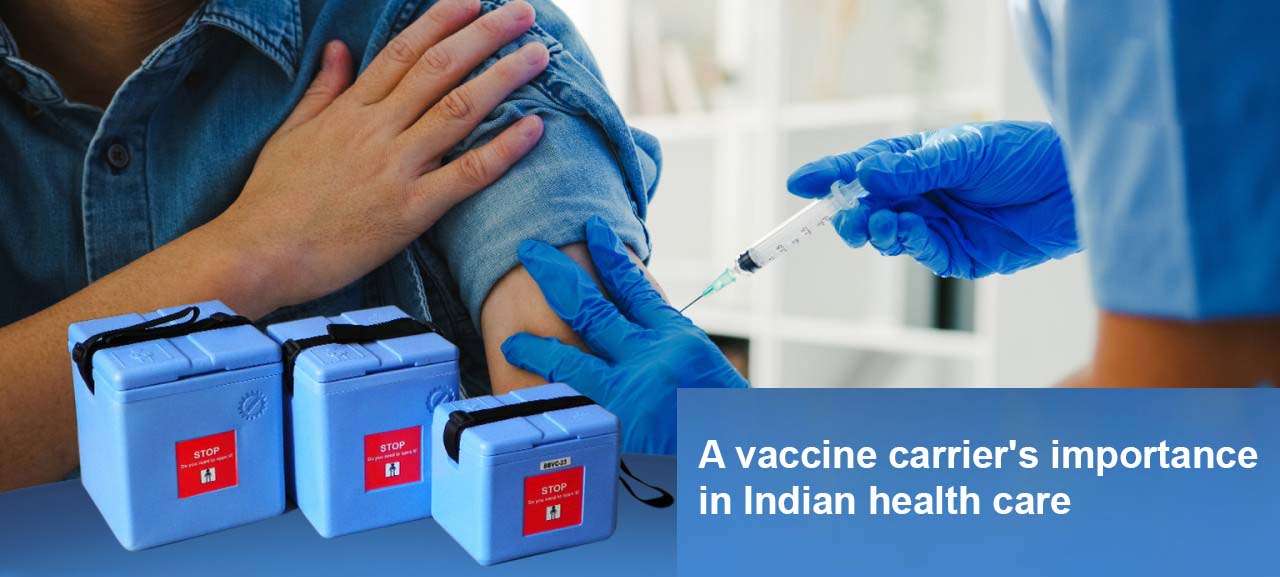A vaccine carrier, also known as a vaccine cooler or vaccine transport box, is a specialized container designed to maintain the proper temperature for storing and transporting vaccines. Vaccines are sensitive biological products that must be kept within a specific temperature range to remain effective.

Key features and functions of a vaccine carrier:
Temperature Control:
Vaccine carriers are insulated containers that help maintain a stable temperature range, typically between 2°C to 8°C (36°F to 46°F). This temperature range is crucial for preserving the potency of most vaccines.
Durability and Portability:
Vaccine carriers are often made of sturdy materials such as plastic or metal to protect the vaccines during transportation. They are designed to be lightweight and portable, making them suitable for use in various settings, including healthcare facilities, clinics, outreach programs, and vaccination campaigns.
Cold Packs or Ice Packs:
Vaccine carriers usually come with cold packs or ice packs that help regulate the internal temperature and keep the vaccines cool during transit. These packs are pre-cooled or frozen before use and placed inside the carrier along with the vaccines.
Capacity and Organization:
Vaccine carriers come in different sizes and configurations to accommodate varying quantities of vaccine vials or syringes. They often feature compartments or racks to organize the vaccines and prevent them from shifting during transportation.
Temperature Monitoring:
Some vaccine carriers include temperature monitoring devices or indicators to ensure that the vaccines remain within the recommended temperature range throughout the journey. These monitoring systems provide visual or digital feedback on temperature status and help identify any temperature excursions that may affect vaccine quality.
Regulatory Compliance:
Vaccine carriers must meet regulatory standards and guidelines for temperature control and vaccine storage. They are often pre-qualified or pre-validated to ensure compliance with regulatory requirements, such as those set forth by the World Health Organization (WHO) or national health authorities.
Longevity and Reusability:
High-quality vaccine carriers are designed for long-term use and can withstand repeated cycles of transportation and storage. They are easy to clean and disinfect between uses to prevent contamination and maintain hygiene standards.
Overall, vaccine carriers play a critical role in preserving the potency and efficacy of vaccines during storage and transportation, ensuring that they reach their intended recipients in optimal condition. Proper use of vaccine carriers helps safeguard public health by minimizing vaccine wastage and maximizing immunization coverage.
A vaccine carrier’s importance in Indian health care:
Vaccine carriers play a crucial role in the healthcare industry in India for several reasons:
Large-Scale Immunization Programs:
India has one of the largest immunization programs in the world, catering to a vast and diverse population. Vaccine carriers are essential for safely transporting vaccines to remote and underserved areas, where access to healthcare facilities may be limited.
Tropical Climate:
India’s diverse climate includes regions with high temperatures and humidity levels, which can degrade vaccine potency if not properly controlled. Vaccine carriers with temperature control mechanisms help maintain the cold chain integrity, ensuring that vaccines remain effective despite environmental conditions. Cold chain equipment is essential for maintaining the integrity of temperature-sensitive products, particularly in industries such as pharmaceuticals, healthcare, food and beverage, and biotechnology.
Challenges of Infrastructure:
India’s healthcare infrastructure varies widely across regions, with some areas lacking consistent access to electricity or refrigeration facilities. Vaccine carriers provide a reliable means of storing and transporting vaccines, even in resource-constrained settings.
Prevention of Vaccine Wastage:
Vaccines are valuable commodities, and any temperature excursions or mishandling during transportation can lead to vaccine wastage. Properly designed vaccine carriers help minimize wastage by maintaining the required temperature range and preserving vaccine potency.
Reach and Accessibility:
India’s vast geography and diverse population present challenges in reaching every individual with life-saving vaccines. Vaccine carriers enable healthcare workers to reach remote villages, urban slums, and other hard-to-reach areas, ensuring equitable access to immunization services.
Disease Control and Public Health:
Vaccination is a cornerstone of disease control and public health initiatives in India. Vaccine carriers support national immunization programs aimed at preventing the spread of infectious diseases, reducing morbidity and mortality rates, and improving overall public health outcomes.
Compliance with Regulatory Standards:
The Indian government and international organizations like the World Health Organization (WHO) have established strict guidelines and standards for vaccine storage and transportation. Vaccine carriers help healthcare providers comply with these regulations and maintain quality assurance in vaccine delivery.
Emergency Response and Outbreak Management:
During disease outbreaks or public health emergencies, rapid deployment of vaccines is essential to contain the spread of infectious diseases. Vaccine carriers allow for the timely distribution of vaccines to affected areas, supporting emergency response efforts and epidemic control measures.
In summary, vaccine carriers are indispensable tools in India’s healthcare industry, facilitating the safe and effective delivery of vaccines to millions of people across the country. They contribute to the success of immunization programs, disease prevention efforts, and overall public health initiatives, ultimately saving lives and improving health outcomes for the population.

